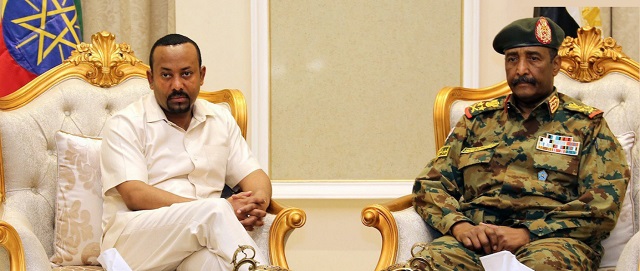
African Union calls for restraint and dialogue
| THE INDEPENDENT | The Chairperson of the African Union Commission, Moussa Faki, has called on Sudan and Ethiopia to refrain from military escalation and to seek a negotiated dispute for the border conflict between the two countries.
The Sudanese army on June 28 attacked Ethiopian troops based in Barkhat area and destroyed their settlement after the killing of seven of its soldiers and the display of their bodies.
In a press release on June 29, Moussa Faki said he was following with “deep concern” the military escalations between Sudan and Ethiopia.
“The Chairperson appeals for complete refrain from any military action whatever its origin and calls for dialogue between the two brotherly countries to solve any dispute,” the statement said.
Faki further called on the two sides to hold negotiations under “the auspices of the AU Border Program”.
Sudan had already rejected any talks with Ethiopia on the Fashaga area. Khartoum says there are two border demarcation agreements sealed in 1902 and 1975.
Faki’s proposal, which is in line with the Ethiopian demand to engage in new discussions, has very little chance of being accepted by the Sudanese government, according to the Sudan Tribune.
Ethiopia said that the abduction of the Sudanese soldiers and their murder were done by a local militia.
Sudan’s armed forces fired heavy artillery during clashes in the disputed eastern region of al-Fashaqa bordering Ethiopia, an Ethiopian official said, the latest salvo in a long-running feud over their shared border.
Sudan was able to capture Jabal Kala al-Laban, an area near the contested border, on June 28 following an artillery barrage and an air raid, according to an anonymous Sudanese military source speaking to Reuters news agency.
On June 27, Ethiopia denied Sudan’s accusation that its army had captured and executed seven Sudanese soldiers and a civilian, instead blaming the killings on a local fighter group.
Sudanese government sources said Sudan had filed a formal complaint with the United Nations Security Council over the killings.
Sudan’s army fired long-distance artillery from June 27 morning until June 28 afternoon, but nobody was injured, said Assefa Ashege, a senior security official in Ethiopia’s Amhara region.
Two local residents said the Sudanese army had gained control of Jabal Kala al-Laban and had destroyed a military base there. It was unclear if the base belonged to the Ethiopian army or an allied fighter group.
Ethiopian military officials referred Reuters to a statement issued on June 28 that described a previous border clash, but did not comment on the reported shelling.
In a statement, Sudan’s military disputed what it said were reports of movements and the taking of prisoners.
The quarrel over al-Fashaqa, which lies within Sudan’s international boundaries but has been settled by Ethiopian farmers for decades, has escalated in recent years alongside a diplomatic spat over Ethiopia’s construction of a hydropower dam.
Since December 2020 the situation on the border between Ethiopia and Sudan has been at a breaking point, with the two countries’ armed forces clashing in several rounds.
Long history
The increased tension on the Sudanese-Ethiopian border comes in the wake of fundamental political ruptures in both countries. But the root of the tension goes a long way back in history, and relates to contested and un-demarcated colonial borders between the two countries and widespread cross-border movement.
The border conflict’s hotspot is known as the Al-Fashaga triangle. The Al-Fashaga triangle covers about 250 square kilometres and has about 600,000 acres of fertile land, naturally watered by three rivers – Setit, Atbara, and Basalam. In addition to livestock herding and farming, seasonal agricultural work, with workers migrating from both sides of the border, constitutes a major livelihood in the area.
Ethiopian militias, known as shifta, have been active along the Sudan-Ethiopia borderfor the last three decades. The shifta have a long history of violent clashes with Sudanese farmers and pastoralists. The Sudanese rural households in the area have reported incidents where the shifta have seized their crops, looted livestock and even taken hostages. Lives have been lost and billions of Sudanese pounds paid as ransom to free the victims. The shifta activity in the area severely impacts their livelihood. The situation is further complicated by the fact that many Sudanese farmers rely on Ethiopians, as labourers migrating across the border during harvesting season.
****
 The Independent Uganda: You get the Truth we Pay the Price
The Independent Uganda: You get the Truth we Pay the Price


